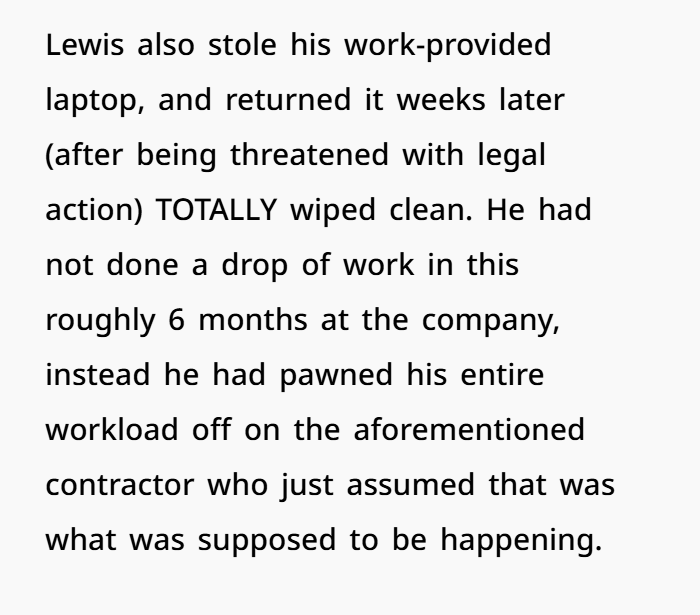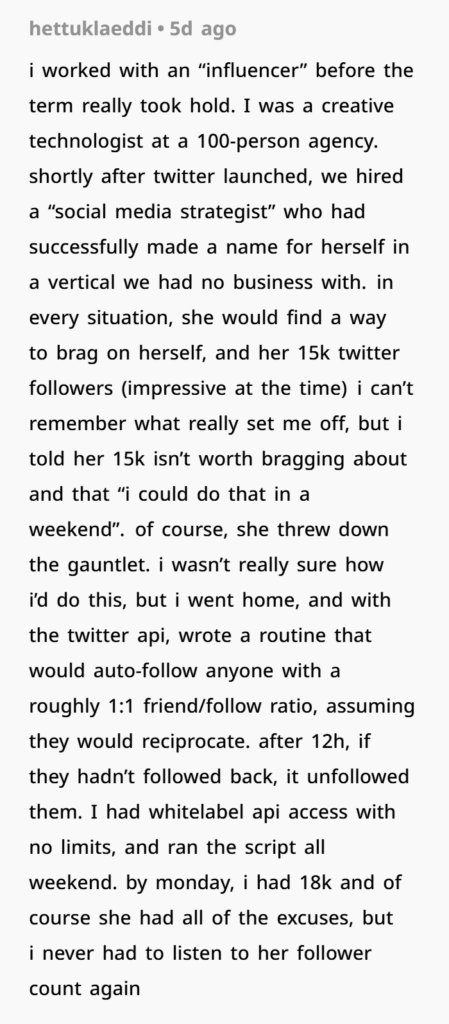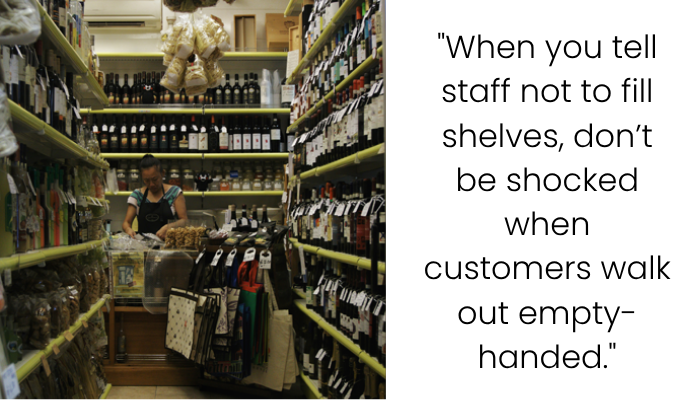Our “Influencer” Coworker Lied His Way Into a Job—Then Crashed and Burned Spectacularly

In this unbelievable workplace saga, OP recounts the dramatic unraveling of a fraudulent “influencer” who conned his way into a social media management role at a mid-sized national company. Lewis, the man in question, was hired based on his supposed popularity and social media savvy. But over six months, red flags started to fly—he missed meetings, avoided responsibilities, and regularly offloaded his work onto an unsuspecting third-party contractor. Despite his incompetence, Lewis maintained a charismatic front, boasting about business ventures, celebrity parties, and influential friends. His tales came with photo “evidence,” which dazzled their manager and seemed to shield him from scrutiny.
Advertisement – Continue Reading Below
But the illusion fell apart one fateful weekend when Lewis accompanied the manager to a business meeting and began spewing wild, provably false claims—including that their employer had acquired his (nonexistent) influencer brand. Alarmed and embarrassed, the manager did some digging and discovered that Lewis was a well-known con artist in local business circles—banned from offices, slapped with restraining orders, and guilty of crashing celebrity events for selfies. He was fired immediately, fled the state the same day, and even tried to erase any trace of wrongdoing by wiping his stolen, company-issued laptop. The aftermath? Shock, relief, and a valuable lesson in trusting appearances over substance.
The “fake it til you make it” is a high-variance approach to career planning

Which means there is a good chance you might fall down the ladder instead of climbing it










Workplace Fraud, Influencer Culture, and Hiring Red Flags
1. Influencer Hype vs. Proven Skill: A Hiring Trap
Hiring based on social clout rather than verifiable experience is becoming increasingly risky in the age of personal branding. Lewis’s case is a prime example of “halo effect” hiring—where charisma and perceived popularity overshadow the need for actual qualifications.
Advertisement – Continue Reading Below
Social media roles, in particular, often fall victim to this. Companies mistakenly equate personal follower counts or party photos with professional acumen. But influencer marketing, while adjacent to social media management, is a vastly different skill set. Managing a corporate brand requires:
- Data analytics
- Audience segmentation
- Strategic content planning
- Reputation and crisis management
Lewis had none of these skills. Yet, because he performed credibility, people accepted it—until reality caught up.

2. Corporate Blind Spots: Why Managers Miss Obvious Red Flags
Your manager’s infatuation with Lewis reflects a common management failure: favoritism based on personality, not performance. The boss was so dazzled by the illusion of celebrity adjacency that he neglected to monitor deliverables or confirm Lewis’s contributions.
Advertisement – Continue Reading Below
In fact, a study by Gallup found that 70% of employee engagement depends on management—particularly their ability to evaluate fairly and manage without bias. When managers buy into a persona over evidence, it creates:
- Lopsided team dynamics
- Reduced morale (as seen in your sighs of relief)
- Hidden burnout (contractors doing unrecognized labor)
By the time the truth emerged, your team had spent months picking up the slack, too intimidated by favoritism to raise concerns.
3. The Psychology of the Grift: What Makes a Workplace Con Artist Tick
Lewis isn’t just a lazy worker—he fits the mold of what psychologists call the corporate grifter: someone who manipulates appearances and charm to climb ladders without effort. These individuals are:
Advertisement – Continue Reading Below
- High in social intelligence
- Comfortable lying to authority
- Skilled at self-promotion
- Terrible at actual work
His use of fake photos, false stories, and name-dropping is reminiscent of notorious cases like Anna Sorokin (aka “Anna Delvey”), who pretended to be a German heiress to infiltrate elite social circles in New York City. While Lewis’s playground was smaller, the con was just as bold—and just as unsustainable.
4. Wider Impact: Workload Dumping and Contractor Exploitation
Perhaps one of the most insidious parts of this story is how Lewis shifted his entire workload onto a contracted social media firm. Contractors often occupy ambiguous spaces in company ecosystems, and without clear oversight, it’s easy for them to be taken advantage of.
This setup likely created:
Advertisement – Continue Reading Below
- Duplicate costs for the company (paying both Lewis and the contractor)
- Devaluation of the contractor’s labor (assuming Lewis was managing)
- A false sense of productivity (someone else was covering the work gap)
In industries reliant on outsourcing, this is a cautionary tale. Companies must establish accountability chains—knowing who’s doing the work, tracking it, and ensuring roles aren’t blurred to enable freeloaders.
5. Damage Control: How Companies Recover From Internal Scams
Your manager did the right thing—eventually. Once the lies were publicly exposed, he acted fast, firing Lewis and informing the team. But had he done regular performance evaluations, or even occasional audits of work output, the deception wouldn’t have lasted six months.

In corporate fraud recovery, the key steps typically include:
Advertisement – Continue Reading Below
- Internal reviews of all projects and communications the grifter touched
- Notification of HR and Legal to track property theft (like the stolen laptop)
- System resets to reassign projects and rebuild trust in the team
That Lewis wiped the laptop adds a layer of malice. It suggests he not only knew he was in over his head but actively tried to erase evidence, potentially risking company data. In tech-based roles, this alone could prompt a lawsuit.
6. Reputation Fallout: When Fake Influence Meets Real Consequences
Lewis fled the state—but his reputation likely won’t travel far. In professional circles, especially in niche industries or mid-sized cities, word spreads quickly. Being banned from executive offices and having a restraining order filed suggests his antics were already infamous.
Your company’s network now knows about the deception. It’s highly unlikely he’ll secure a similar position without extensive vetting—especially in an age where digital footprints are hard to erase.
Advertisement – Continue Reading Below
This case is a live-action warning: Don’t hire someone just because they seem popular. Verify. Validate. Vet.
After their story went viral, the employee provided more information about their former manager







✅ Final Takeaways
- Don’t mistake charisma for competence—real skill should always be verifiable.
- Managers must look past flash and examine deliverables.
- Contractor labor should be protected, not exploited as a scapegoat.
- Con artists rely on silence—your relief shows how fear of favoritism hurts teams.
- Reputation is powerful—and once lost, hard to rebuild.
Lewis might have played the part of a high-flying influencer, but in the end, the only thing he influenced was a swift corporate exit—and a room full of exhausted coworkers happy to see him go.






